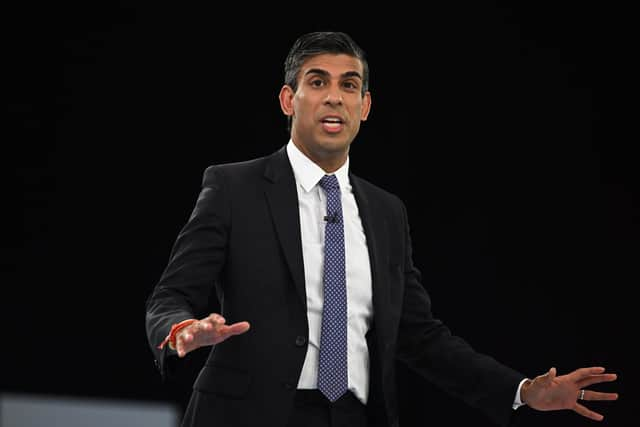Pay freeze for public sector and tax rises for the nation expected later this month
Rishi Sunak and Jeremy Hunt are reportedly considering capping public sector pay rises at 2 per cent for 2023-24, which would be a real-terms pay cut for nurses, teachers and police officers amid inflation of almost 5 times that amount.
This will likely lead to further calls for industrial action by unions who have already begun balloting their members for strikes over the winter.
Advertisement
Hide AdAdvertisement
Hide AdChristina McAnea, UNISON’s general secretary said yesterday: “Holding down pay for public sector staff is the worst possible response.


“This shows a government with no ideas, nor a grasp of the reality of people’s lives,” she added.
It comes following research published by the Trade Union Congress (TUC) which showed widespread poverty for public sector workers’ families.
Mark Serwotka, the general secretary of the PCS union for civil servants said it was urging its members to vote yes for strike action in order to secure a 10 per cent pay rise.
Advertisement
Hide AdAdvertisement
Hide Ad“It’s scandalous the government is even considering imposing another pay cap on hard-working civil servants,” he said.
“Ministers were quick to clap public servants during the pandemic, now they are quick to treat them with disdain.
It comes amid reports also suggested that “everyone” in the UK will have to pay more tax to pay for the cost of the pandemic and the energy bailout scheme.
The pair are expected to extend a freeze on the thresholds at which people start to pay the different rates of income tax and national insurance, which could result in more people being dragged into higher tax bands as wages increase.
Advertisement
Hide AdAdvertisement
Hide AdA Treasury source told the Times: "It is going to be rough. The truth is that everybody will need to contribute more in tax if we are to maintain public services.
“After borrowing hundreds of billions of pounds through Covid-19 and implementing massive energy bills support, we won't be able to fill the fiscal black hole through spending cuts alone."
Among those who are under pressure to pay more tax are energy companies, following yesterday’s announcement by BP that its profits had more than doubled over the past quarter.
The company said that it expects to pay around $800 million in windfall taxes this year, while Shell has previously said that it will not pay any.
Advertisement
Hide AdAdvertisement
Hide AdThe £7.1 billion made by BP between July and September led to Alok Sharma, the Cop26 president who was recently demoted from cabinet by Rishi Sunak, to call for a further tax on their profits.
“We need to raise more money from a windfall tax on oil and gas companies and actively encourage them to invest in renewables,” he said.
Yesterday during a meeting of Cabinet, Mr Sunak told his top team that the NHS would be “prioritised” amid “difficult decisions” over spending.
He and Jeremy Hunt, his Chancellor, are currently working on this month’s Autumn budget which will likely see both spending cuts and tax rises to fill a black hole of up to £50 billion on 17 November.
Advertisement
Hide AdAdvertisement
Hide AdWhile the NHS could see some protection, other departments will not be kept as safe.
Ben Wallace, the Defence Secretary, said yesterday that he will have a meeting with Mr Hunt this week to discuss what plans the Chancellor has for defence spending.
“Obviously, we’re having to take… account of the economic challenges at the moment,” he told a House of Lords committee.
Meanwhile Andrew Mitchell, the newly-appointed Development minister insisted that spending on international aid will be raised back to pre-pandemic levels “as soon as possible”.